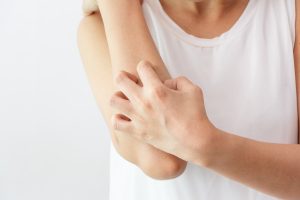 In the April issue of Retail Pharmacy magazine, we looked at the revolution that eczema treatments are currently undergoing in Australia.
In the April issue of Retail Pharmacy magazine, we looked at the revolution that eczema treatments are currently undergoing in Australia.
30% of Australians are affected by eczema and 99% of cases can be treated via anti-inflammatory creams. However, to make treatment easier, it is best to know what triggers patient’s eczema.
There are a range of factors, some of which is environmental or, diets, climate, humidity levels, external irritants such as certain chemicals, workplace issues and stress, just to name a few.
There are some triggers of eczema that are impossible to control.
“Eczema is nearly always worse in winter when there’s low humidity, because then the skin dries out more,” says Associate Professor Gayle Fischer, Head of Dermatology at the Royal North Shore Hospital in Sydney.
“But there are [also] people who are worse in hot weather, for all sorts of reasons. Some people worsen in summer because they go into chlorinated pools to swim, which dries out the skin.”
Dry and itchy skin occurs when the air temperature and humidity levels are either too hot or too dry.
Professor Sinclair, of Sinclair Dermatology explains: “So, if you have dry skin and you make it itchy through heat, you’re then predisposed to scratching.
“And if you scratch it, you’ll then produce eczema. A lot of scratching occurs in the sleep when people are too hot in bed at night. If you scratch it and you produce eczema, then you keep on scratching it, the eczema will become infected or lichenified.”
The winter and summer weather’s both have the ability to completely dry out skin, and produce eczema – however, with the correct treatments, you can beat the heat (or cold).
To read more on how to treat eczema, head to the latest issue of Retail Pharmacy magazine.








